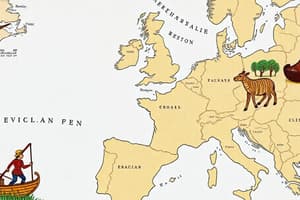Podcast
Questions and Answers
What does the term 'Age of Exploration' refer to?
What does the term 'Age of Exploration' refer to?
- The study of geographical features
- The process of developing manufacturing on a large scale
- A period of European exploration from 1418 to 1620 (correct)
- The time when machines were first used in manufacturing
What is the Agricultural Revolution?
What is the Agricultural Revolution?
The transformation of agriculture from traditional medieval farming to more productive and efficient methods between mid 1700 to 1800.
What is a cause?
What is a cause?
The reason why something happens.
What is coal?
What is coal?
What does the term 'colonial' refer to?
What does the term 'colonial' refer to?
What is a colony?
What is a colony?
What does 'combustible' mean?
What does 'combustible' mean?
What does 'complex' mean?
What does 'complex' mean?
What is contextualization in historical thinking?
What is contextualization in historical thinking?
What is economics?
What is economics?
What does 'efficient' mean?
What does 'efficient' mean?
What is a factory?
What is a factory?
What is a fertilizer?
What is a fertilizer?
What are finished goods?
What are finished goods?
What does 'geographical context' refer to?
What does 'geographical context' refer to?
What are geographic features?
What are geographic features?
What is a good?
What is a good?
Where did the Industrial Revolution begin?
Where did the Industrial Revolution begin?
What is a harbor?
What is a harbor?
What are historical circumstances?
What are historical circumstances?
What is the Industrial Revolution?
What is the Industrial Revolution?
What is industrialization?
What is industrialization?
What does 'innovation' mean?
What does 'innovation' mean?
What is an irregular coastline?
What is an irregular coastline?
Flashcards
Age of Exploration
Age of Exploration
European exploration and discovery spanning from 1418 to 1620.
Agricultural Revolution
Agricultural Revolution
Transformation of agriculture (mid-1700s to 1800s) using better techniques and scientific innovation.
Coal
Coal
Combustible rock, mainly carbonized plant material, serving as a primary fuel.
Colonial Context
Colonial Context
Signup and view all the flashcards
Colony
Colony
Signup and view all the flashcards
Combustible
Combustible
Signup and view all the flashcards
Complexity
Complexity
Signup and view all the flashcards
Contextualization
Contextualization
Signup and view all the flashcards
Economics
Economics
Signup and view all the flashcards
Efficiency
Efficiency
Signup and view all the flashcards
Factory
Factory
Signup and view all the flashcards
Fertilizer
Fertilizer
Signup and view all the flashcards
Finished Goods
Finished Goods
Signup and view all the flashcards
Geographical Context
Geographical Context
Signup and view all the flashcards
Geographic Features
Geographic Features
Signup and view all the flashcards
Goods
Goods
Signup and view all the flashcards
Great Britain
Great Britain
Signup and view all the flashcards
Harbor
Harbor
Signup and view all the flashcards
Historical Circumstances
Historical Circumstances
Signup and view all the flashcards
Industrial Revolution
Industrial Revolution
Signup and view all the flashcards
Industrialization
Industrialization
Signup and view all the flashcards
Innovation
Innovation
Signup and view all the flashcards
Irregular Coastline
Irregular Coastline
Signup and view all the flashcards
Study Notes
Age of Exploration
- Period spanning from 1418 to 1620 marked by European exploration and discovery.
Agricultural Revolution
- Transformed agriculture between the mid-1700s and 1800s through enhanced techniques and scientific innovation.
- Shifted from traditional farming methods to more productive and efficient mechanical farming.
Coal
- A combustible rock mainly composed of carbonized plant material, significant for being a primary fuel source.
Colonial Context
- Refers to characteristics and aspects associated with colonies, which are groups under the control of a distant parent country.
Colony
- A settlement where a group of people is governed by an external nation.
Combustible
- Describes materials that can easily catch fire or combust.
Complexity
- Refers to systems or concepts that are intricate and detailed.
Contextualization
- A historical skill that involves placing events within a larger narrative to understand their significance.
Economics
- The study of human behavior in satisfying needs and wants through various choices.
Efficiency
- The capacity to achieve maximum productivity without wasted resources.
Factory
- A large facility equipped with machinery for the production of goods.
Fertilizer
- Substances added to soil to enhance its fertility for better crop growth.
Finished Goods
- Products that have been completed in production and are awaiting sale.
Geographical Context
- The relevant geographic area tied to a specific issue or discovery.
Geographic Features
- Physical elements of the Earth, such as mountains, valleys, and bodies of water that shape human activity.
Goods
- Tangible items that consumers can purchase.
Great Britain
- The initial location where the Industrial Revolution commenced.
Harbor
- A safe, sheltered area along a coast for ships to anchor, facilitating trade and transportation.
Historical Circumstances
- The societal context that interacts with economic conditions influencing events.
Industrial Revolution
- A significant era of rapid advancements in machine use for manufacturing beginning in the mid-1700s.
Industrialization
- The large-scale development of manufacturing processes.
Innovation
- Enhancements or improvements made to existing technologies or methodologies.
Irregular Coastline
- Coastlines characterized by jagged edges that create natural ports, aiding in transportation and naval development, conducive for manufacturing.
Studying That Suits You
Use AI to generate personalized quizzes and flashcards to suit your learning preferences.




